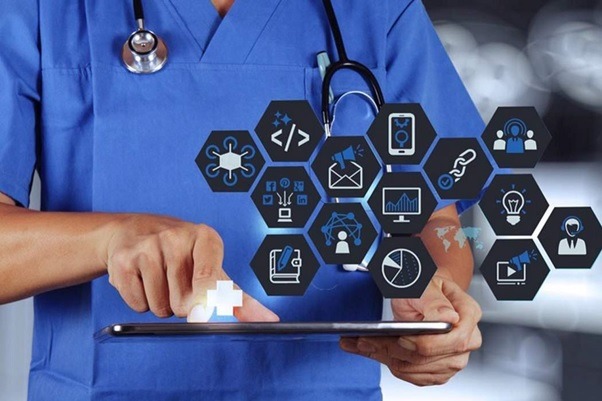The Healthcare sector is a vital industry around us which had been subject to a number of frauds and theft of patient data. One of those was in 2017 when a number of healthcare professionals were arrested by state authorities in the U.S. for doing fraudulent transactions worth $1.3 billion. The Healthcare industry is one of those complicated industries which suffered from many such incidents where the cost of such breaches was around 2.5 times more when compared to any other industry.
Even if there have been tremendous advancements in areas pertaining to research, diagnosis, and even efficient cure, when we talk about creating a secure, unified healthcare system, the healthcare sector takes a backseat. There are certain areas where Blockchain development in healthcare can revolutionize the industry as the systems which are been put in use by our healthcare industry are error-prone and outdated when providing security and efficiency comes.
Here let’s have look at some of the use cases of Blockchain in the healthcare sector to know how Blockchain is changing the healthcare sector:
Blockchain use-cases in the Healthcare sector
Preventing medication error
There had been instances of medication errors, many times, where every day one person per day falls victim to it, and here Blockchain can come up with a solution for it. Access to accurate and timely medication histories across healthcare institutions enables effective patient care, which always may not happen due to centralized systems for data sharing. In many cases, there had been cases where histories transferred from one institution to another differs and medication error might occur. Blockchain-based decentralized medication management system, which can work over Hyperledger, can come with a solution.
Patient data management
Medical records of patients are generally scattered through various health agencies, which in turn makes it very much difficult to determine a patient’s medical history without consulting their previous care provider. Again, this fetching of data from previous care provider can consume much time which in turn delays the treatment to commence or even result in mistakes due to human error. To address this problem, a Medical Records ledger can be made which is based upon the Ethereum blockchain. It can be made for storing all of a patient’s information in one place, where doctors, as well as other stakeholders along with patients, can view it. Ultimately it can pave the way for quick treatment.
Relief and rehabilitation work
The potential of blockchain can be exploited for relief works. Like where there are multiple partners and each partner is assigned specific work it requires collaborating efficiently to relief services to happen. Here in such cases, Blockchain automates the interaction and supply processes, keeping human interaction to the minimum level, thereby lessening the scope of human error to happen.
Stopping counterfeit drug
It is no secret that there have been numerous cases of drug counterfeiting, which affects tens of thousands of people globally. The blockchain-based supply chain for pharmaceuticals tracks when a medicine has been changed or altered in any way with the help of AI and data analytics. This allows consumers to see know-how and from where their drugs came, thereby building consumer confidence by keeping the menace of counterfeit drugs at bay.
Electronic Health Records (EHR)
Managing Electronic Health Records (EHR) can be a challenging task as the EHR of different health care service providers can be different and this turns out to be very time-consuming. By using Application Program Interfaces (API) and blockchain, a patient will have control over his data and it will require his consent to transfer records from one doctor to another.
Tracking of clinical trials
IoT infused with Blockchain can be put into use to track trials in the health care sector with the aid of sensors. Blockchain will enable the better traceability of ingredients in drugs and a better understanding of patient well-being conditions.
Reinforcing security of medical transactions
Transactions that take place in the health sector can be made more transparent and easily accessible through Blockchain. Where it may streamline the hospitals and health systems to manage claims and remittances or even claim insurance. With Blockchain-based automated process, it may even minimize denials and underpayments and even reduce the scope of errors by maintaining daily ledger business operations more effectively which are done manually.
Data security in health care
A specialized cybersecurity module can be formulated with the help of Blockchain for health care. Where the system might validate and sign every data asset with a cryptographic stamp along with the ability to track back the origins of each piece. Such a platform can be for every stakeholder like patients, providers, and regulators, and is able to spot any attempt of forgery or theft of data in real-time.
Improve the interaction between patient – doctor
Blockchain offers patients to share their data instantly through their mobile devices, while their data is kept securely over the Blockchain network. Medical professionals can get access to patient data by scanning any sensor-based wearable devices which patients can wear or authorization can be obtained through bio-metrics. Two-way communication between doctor-patient can easily happen to enable online video consultations with doctors over the Blockchain-based secure network.
Conclusion
Blockchain is a futuristic technology perfectly suited to completely overhauled the healthcare sector as said by Blockchain consultant at Rejolut. Many healthcare and blockchain companies are working in tandem to improve healthcare for both professionals and patients alike. The decentralization of patient data, tracking of pharmaceuticals supplies and improving payment options through use of smart contract will certainly pave way towards better patient experience.

